-
January
-
February
- This Week in History: February 6-12 – Lesson
- This Week in History: February 6-12 – Quiz
- This Week in History: February 13-19 – Lesson
- This Week in History: February 13-19 – Quiz
- This Week in History: February 20-26 – Lesson
- This Week in History: February 20-26 – Quiz
- This Week in History: February 27-March 5 – Lesson
- This Week in History: February 27-March 5 – Quiz
-
March
- This Week in History: March 6-12 – Lesson
- This Week in History: March 6-12 – Quiz
- This Week in History: March 13-19 – Lesson
- This Week in History: March 13-19 – Quiz
- This Week in History: March 20-26 – Lesson
- This Week in History: March 20-26 – Quiz
- This Week in History: March 27-April 2 – Lesson
- This Week in History: March 27-April 2 – Quiz
-
April
- This Week in History April 3-9 – Lesson
- This Week in History April 3-9 – Quiz
- This Week in History: April 10-16 – Lesson
- This Week in History: April 10-16 – Quiz
- This Week in History: April 17-23 – Lesson
- This Week in History: April 17-23 – Quiz
- This Week in History: April 24-30 – Lesson
- This Week in History: April 24-30 – Quiz
-
May
- This Week in History: May 1 – 7 – Lesson
- This Week in History: May 1 – 7 – Quiz
- This Week in History: May 8 – 14 – Lesson
- This Week in History: May 8 – 14 – Quiz
- This Week in History: May 15 – 21 – Lesson
- This Week in History: May 15 – 21 – Quiz
- This Week in History: May 22-28 – Lesson
- This Week in History: May 22-28 – Quiz
- This Week in History: May 29-June 4 – Lesson
- This Week in History: May 29-June 4 – Quiz
-
June
- This Week in History: June 5 – 11 – Lesson
- This Week in History: June 5 – 11 – Quiz
- This Week in History: June 12-18 – Lesson
- This Week in History: June 12-18 – Quiz
- This Week in History: June 19-25 – Lesson
- This Week in History: June 19-25 – Quiz
- This Week in History: June 26 – July 2 – Lesson
- This Week in History: June 26 – July 2 – Quiz
-
July
- This Week in History: July 3 – 9 – Lesson
- This Week in History: July 3 – 9 – Quiz
- This Week in History: July 10 – 16 – Lesson
- This Week in History: July 10 – 16 – Quiz
- This Week in History July 17 – 23 – Lesson
- This Week in History July 17 – 23 – Quiz
- This Week in History – July 24-30 – Lesson
- This Week in History – July 24-30 – Quiz
- This Week in History: July 31 – August 6 – Lesson
- This Week in History: July 31 – August 6 – Quiz
-
August
- This Week in History: August 7-13 – Lesson
- This Week in History: August 7-13 – Quiz
- This Week in History: August 14 – 20 – Lesson
- This Week in History: August 14 – 20 – Quiz
- This Week in History: August 21 – 27 – Lesson
- This Week in History: August 21 – 27 – Quiz
- This Week in History: August 28 – September 3 – Lesson
- This Week in History: August 28 – September 3 – Quiz
-
September
- This Week in History: September 4 – 10 – Lesson
- This Week in History: September 4 – 10 – Quiz
- This Week in History: September 11 -17 – Lesson
- This Week in History: September 11 -17 – Quiz
- This Week in History: September 18 – 24 – Lesson
- This Week in History: September 18 – 24 – Quiz
- This Week in History: September 25 – October 1 – Lesson
- This Week in History: September 25 – October 1 – Quiz
-
October
- This Week in History: October 2-8 – Lesson
- This Week in History: October 2-8 – Quiz
- This Week in History: October 9 –15 – Lesson
- This Week in History: October 9 –15 – Quiz
- This Week in History: October 16–22 – Lesson
- This Week in History: October 16–22 – Quiz
- This Week in History: October 23–29 – Lesson
- This Week in History: October 23 –29 – Quiz
- This Week in History: October 30 – November 5 – Lesson
- This Week in History: October 30 – November 5 – Quiz
-
November
- This Week in History: November 6 – 12 – Lesson
- This Week in History: November 6 – 12 – Quiz
- This Week in History: November 13 – 19 – Lesson
- This Week in History: November 13 – 19 – Quiz
- This Week in History: November 20 – 26 – Lesson
- This Week in History: November 20 – 26 – Quiz
- This Week in History: November 27- December 3 – Lesson
- This Week in History: November 27- December 3 – Quiz
-
December
This Week in History: September 4 – 10 – Lesson
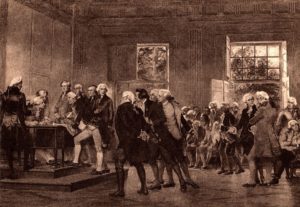
Signing the Declaration of Independence, Illustration. (Photo by: Universal History Archive/Universal Images Group via Getty Images)
“Neither the life of an individual nor the history of a society can be understood without understanding both.” ~ C. Wright Mills
The Birth of the United States
September 5, 1774
The American colonists were tired of the control Britain had over them and had been rebelling for years. On this day, delegates from 13 of the colonies met at Carpenters’ Hall in Philadelphia. Georgia was the only colony not to send a delegate because it was fighting a Native American uprising and, unfortunately, needed the military supplies the British provided.
This group was called the First Continental Congress, and the members gathered to organize a way to resist what they called the Intolerable Acts that had been passed by the British Parliament. Some of American history’s most renowned figures were in attendance, including future presidents George Washington and John Adams.
The Congress met for six weeks, and its goal was to repair the colonists’ relationship with the British. It issued a Declaration of Rights, which still affirmed the New World’s loyalty to the British Crown but denied the Parliament’s right to tax the colonists without representing them.
September 9, 1776
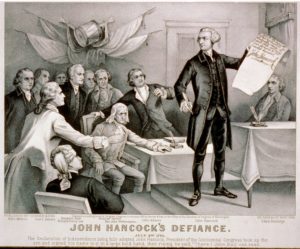
(Photo by: Universal History Archive/UIG via Getty images)
Two years later, an agreement had still not been reached between the colonists and Britain. A Second Continental Congress got together in 1775 to try again, but this attempt failed too. In July 1776, the Congress took the big step of declaring America independent from Britain, and issued the Declaration of Independence.
In September 1776, the Second Continental Congress met again and, among other things, decided to change the name of the nation from the “United Colonies” to the United States of America. Thomas Jefferson is given the credit for coming up with the name since he often used it when he wrote the Declaration of Independence. In June of that year, a draft version started with the sentence: “A Declaration of the Representatives of the UNITED STATES OF AMERICA in General Congress assembled.” In the final version, dated July 4, 1776, the first sentence reads: “The unanimous Declaration of the thirteen united States of America.”
Interesting Fact
Almost every significant political figure of the American Revolution served in the Continental Congress, including Samuel Adams, John Adams, John Hancock, John Jay, Alexander Hamilton, Thomas Jefferson, Benjamin Franklin, James Madison, Patrick Henry, and George Washington.
Other Notable History Mentions

September 4, 1609: Navigator Henry Hudson discovered the island of Manhattan.
September 4, 1781: Felipe de Neve, Spanish Governor of California, founded Los Angeles near the Native American village Yang-na. It was originally named El Pueblo de la Reina de Los Angeles, which means “The Town of the Queen of the Angels.”
September 4, 1886: Apache Native American Geronimo was captured, ending the last US-Indian war.
September 5, 1975: The first assassination attempt on President Gerald Ford happened. A woman pointed a gun at him in Sacramento, California. Two weeks later, there was a second attempt by a different woman, who fired a shot at him in San Francisco. The president was not hurt in either attack.
September 5, 1997: Mother Teresa, at the age of 87, died in Calcutta. She spent her life helping the poor and sick in India.
September 6, 1991: Russian legislators renamed the city of Leningrad to Saint Petersburg. It had been known as Leningrad for 67 years, after the founder of the Soviet Union, Vladimir Lenin.
September 7, 1822: After being a colony for 322 years, Brazil declared independence from Portugal.
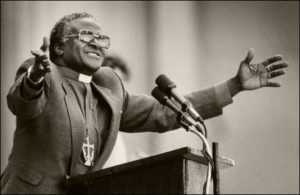
Desmond Tutu (Photo by Bromberger Hoover Photography/Getty Images)
September 7, 1940: During World War II, the German Luftwaffe started “Blitz bombing” London.
September 7, 1986: Bishop Desmond Tutu became the first black man to head South Africa’s Anglicans when he became the Archbishop of Cape Town.
September 7, 1994: After almost 50 years in the city, the US Army closed its command in Berlin.
September 8, 1565: At St. Augustine, Florida, Spaniard Don Pedro Menendez de Aviles founded the first Catholic settlement in America.
September 8, 1883: The Northern Pacific Railroad that crossed the US was completed.
September 8, 1900: The worst natural disaster in US history happened in Galveston, Texas, with a hurricane that killed 8,000 people.
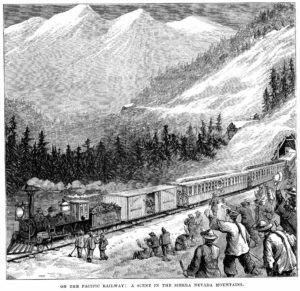
Engraving showing the Central Pacific Railroad in the Sierra Nevada mountains. (Photo by: Photo12/Universal Images Group via Getty Images)
September 8, 1941: The German Army started its blockade of Leningrad, which lasted for three years during World War II.
September 8, 1974: Former President Richard Nixon was granted a full pardon by President Gerald R. Ford for the Watergate scandal about a month after he resigned from office.
September 9, 1943: During World War II, the invasion of Salerno began.
September 9, 1948: The Democratic People’s Republic of Korea was formed after Soviet forces withdrew from North Korea. Pyongyang was named the capitol.
September 9, 1976: Chairman Mao Zedong, a leader of Communist China, died.
September 9, 1993: After 100 years of conflict, Israel and the Palestine Liberation Organization (PLO) agreed to recognize each other, making it easier for peace to exist between the Arabs and Jews.
September 10, 1898: Elizabeth was assassinated in Geneva. She was the Empress of Austria-Hungary.
September 10, 1919: After World War I, the Allies signed the Treaty of Saint-Germain which gave parts of German-Austria to Italy and Czechoslovakia.
Famous Birthdays
Jesse James (September 5, 1847) was born in Centerville, Missouri. A Wild West legend, he and his brother, Frank, formed a band of outlaws who robbed stagecoaches, trains, and banks.
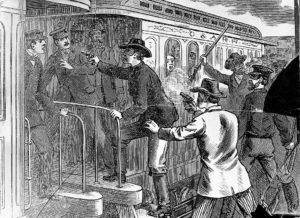
Jesse James and his gang robbing a train. (Getty Images)
Darryl F. Zanuck (September 5, 1902) was born in Wahoo, Nebraska. A film producer, he co-founded 20th Century Studios, which later joined with Fox. Some of his best-known works include The Jazz Singer and The Grapes of Wrath.
Marquis de Lafayette (September 6, 1757) was born in Chavaniac as Marie-Joseph-Paul-Yves-Roch-Gilbert du Motier. In 1777, he went to the colonies to volunteer in the American Revolution and was a good friend of George Washington.
Jane Addams (September 6, 1860) was born in Cedarville, Illinois. She was considered a pioneering social worker who toured European cities to study famous historical sites. After witnessing hunger of the people, she founded Hull House in Chicago to serve the sick and poor.
Queen Elizabeth I (September 7, 1533) was born in Greenwich Palace. The daughter of King Henry VIII and Anne Boleyn, she became queen at the age of 25. During her reign, the Anglican Church was established, and Britain defeated the Spanish Armada.